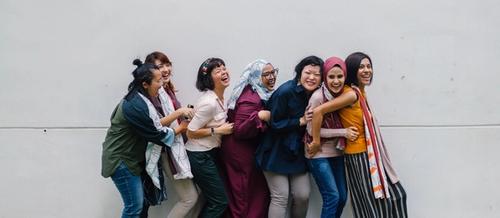
Creative embodied group supervision for therapists, clinicians and service providers
Join a small group of peers to learn, explore, connect, express and reflect through shared discussion, music and creative arts experiences.

Connectedness is protective in the face of adversity.
I’m not sure when or how I first came across the term collective care.
I do know that my initial thoughts about its intention were influenced by my experiences of supportive colleagues and teams, and were aligned with:
As someone who struggles with the individualistic focus of the idea of 'self care', the concept of collective care offers a welcome and more holistic approach to how we can care for ourselves and each other in relation to the ups and downs of helping work.
In many ways, the idea of collective care sits alongside self care as it supports, nourishes, and upholds us individually, as well as through a lens of accountability and peer support.
If anything, beyond general peer support, I had probably thought of collective care as a political stance against the commodification of 'self care':
It is only very recently that I looked into a definition of collective care.
I was unaware that the concept of collective care emerged from principles and practices of social justice and activism.
For example, Act Build Change describe collective care as
whilst social justice advocates Mehreen and Gray-Donald state:
Mehreen and Gray-Donald go on to add:
'It means that a group commits to addressing interlocking oppressions and reasons for deteriorating well-being within the group while also combatting oppression in society at large. It places an emphasis on joint accountability, with the aim of collective empowerment'.
Counsellor, supervisor and activist, Vikki Reynolds, incorporates ideas of social justice, solidarity, resistance and 'collective ethics' into her stance of collective care for counsellors working with people who are dying on death row or in the community from opioid abuse:
'I am inspired by questions not so much of resisting "burnout", but of how we can act in solidarity to keep the spirit of our collective ethics alive in our work and lives*: How can we be connected with this aliveness? How do we hold onto our collective ethics more fully?' (*bold added by author).
This approach:
When counsellors are able to work in accord with their ethical stance then sustainability becomes possible.
We need to hold ourselves and our clients and patients at the centre of our work. This is not easy to do (from both sides of the relationship!) in work with human beings who are glorious, messy, wonderful and complicated.
Having a group of peers who get the work, the good, the bad and the ugly, is essential. We know this - health teams everywhere turn to each other for support every day. We also know that overwhelmed and toxic systems, and plain old personality clashes, teams can also be places that lack trust, safety and care for each other.
We need new ways to conceptualise support for healthcare workers that go beyond current approaches.
Ideas of collective care can help us to conceptualise a different type of peer support; one that offers and invites:
For more, see Conceptualising a practice of collective care in health work.
The problem of staying alive and healthy in the work currently gets constructed as a very individual project. Yet the issues are social and require collective actions and collective accountability.

Creative embodied group supervision for therapists, clinicians and service providers
Join a small group of peers to learn, explore, connect, express and reflect through shared discussion, music and creative arts experiences.

Why collective care is essential for self care
When so many of our challenges are a result of pressures from work and (rather topically) society in general – reference to ‘self care’ can seem to be a dismissal at best. What of the larger systems and social mechanisms at play? How can we look after ourselves and each other? Social buffering and ideas about connection and empathy give us some clues.

Why 'self care' is not enough for healthcare workers
There is a worldwide shortage of healthcare workers. And many of the workers that are available are not travelling well. Whilst the web is awash with the latest self care tips and tricks, this individualistic focus fails to acknowledge the systemic and cultural issues at play. Although it is important for everyone to look after themselves, the push for self care alone is problematic as it lodges the problem in the individual, rather than addressing the social and systemic issues that need wider consideration.
Header image: Ahmed on unsplash